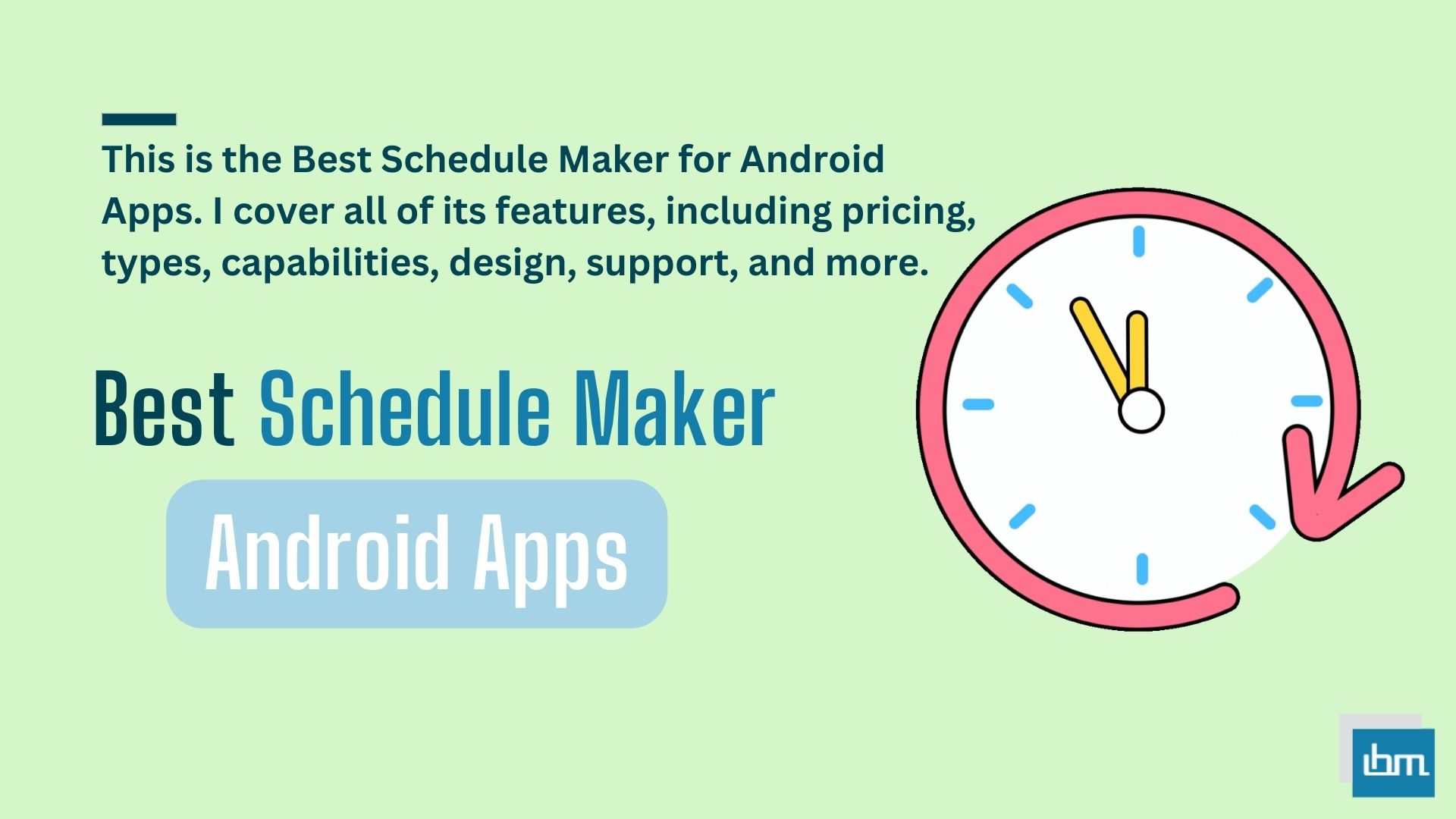Best Schedule Maker for Android Apps. ClickUp is our top choice for the best online schedule maker, whether it’s for personal or professional use. It offers a cost-effective solution with custom integrations and a range of project management features. Collaborating with others is a breeze on ClickUp. However, if ClickUp doesn’t meet your requirements, we have identified several other excellent scheduling tools to help you stay organized. Here, we present the top 9 online schedule makers available.
To narrow down our list, we considered five key features. The best scheduling apps should have custom integrations, team collaboration capabilities, the ability to share schedules, the option to export schedules to other apps, and analytics. These features ensure that maintaining and sharing organized schedules and calendars is as effortless as possible.
Each app on our list offers a free version, allowing you to test different schedulers and find the one that suits you best. ClickUp and Asana are ideal for teams managing complex workflows, while Doodle and Google Calendar are better suited for small businesses and individuals seeking a personal scheduling app.
The best scheduling apps go beyond calendar organization. Apps like ClickUp, Asana, Homebase, and others simplify workflow management, team communication, and file sharing. When exploring these apps, be sure to make the most of all the available features to enhance your scheduling experience.
What is Best Schedule Maker for Android Apps.
Here are my top picks for the best Android Schedule Maker apps to use for your personal and professional needs. It offers a cost-effective solution with custom integrations and a range of project management features.
1. Clickup.
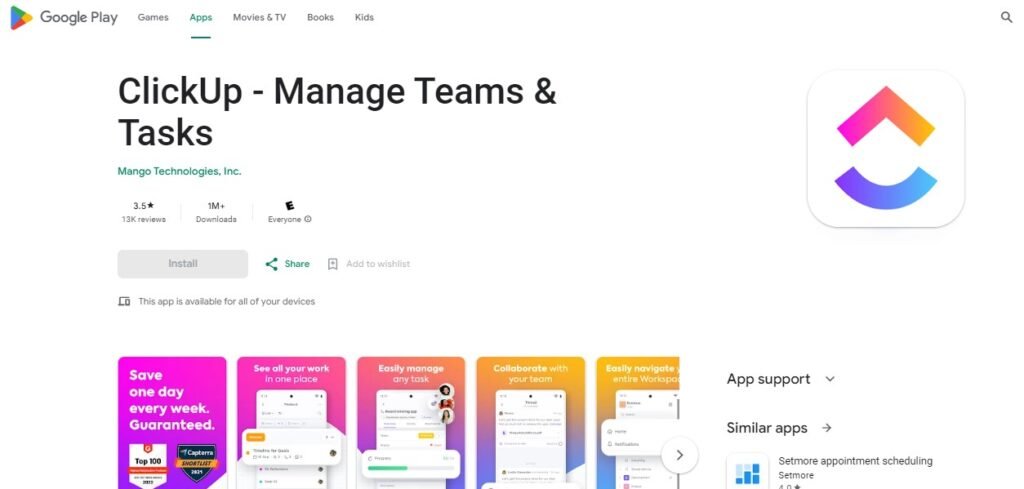
ClickUp stands out as the top choice for an online schedule maker due to its extensive array of time management and project management capabilities. In addition to the ability to generate and distribute your calendar, ClickUp empowers you to establish tasks, set and monitor goals, create projects, and uniquely, develop documents and knowledge bases for your team’s reference.
Moreover, ClickUp seamlessly integrates with over 1,000 productivity tools, including popular ones like Slack and Google Drive. With ClickUp’s free tier, you can enjoy unlimited tasks and members, and by opting for the Unlimited tier at just $5 per member per month, you can unlock even more features and integrations.
Key Features:
- Access the free version of the product.
- Choose from different subscription plans, including the Unlimited plan at $5 per member per month, billed annually.
- Enjoy various support options such as Email, Chat, Live Support, Help/Resource Center, Ticket, FAQs, and Community.
Pros:
- Budget-friendly rates.
- Comprehensive complimentary package.
- Over 1,000 integrations available.
Cons:
- Absence of analytics.
- Lack of analytics.
- Analytics not available.
2. Calendly.
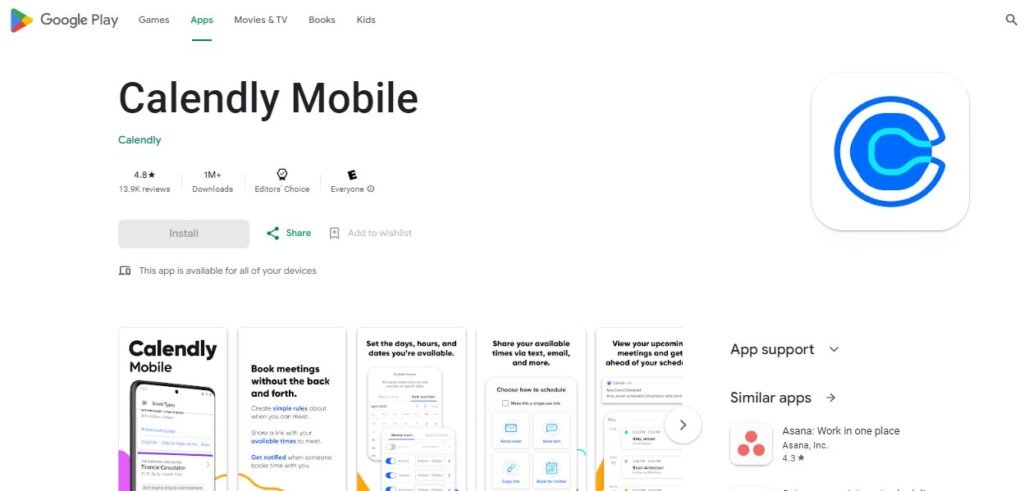
Calendly is a comprehensive scheduling application designed to cater to the needs of individuals, teams, and organizations. With Calendly, users can effortlessly schedule appointments by setting specific rules, sharing their available meeting times through a personalized link or email embedding, and receiving timely notifications via email or text when an appointment is booked.
What sets Calendly apart from other similar apps is its ability to offer unlimited appointments for free, making it an ideal tool for efficiently managing busy schedules. For just $8 per month, users can upgrade to Essentials, which allows them to connect two calendars per user, add unlimited event types, and access valuable scheduling metrics and reporting.
Moreover, Calendly seamlessly integrates with popular productivity platforms such as Google Drive, Office 365, Slack, Salesforce, Zoom, HubSpot, and Zapier, further enhancing its functionality and convenience.
Key Features:
- Access the free version.
- Choose from subscription plans: Basic for $0, Essentials for $8/month, Professional for $12/month.
- Utilize support options: Email, Help Center, Community, Video Tutorials.
Pros:
- Endless opportunities for appointments.
- Vast array of integrations available.
- A wide range of options for scheduling meetings and appointments.
Cons:
- Absence of employee scheduling.
3. Google Calendar.
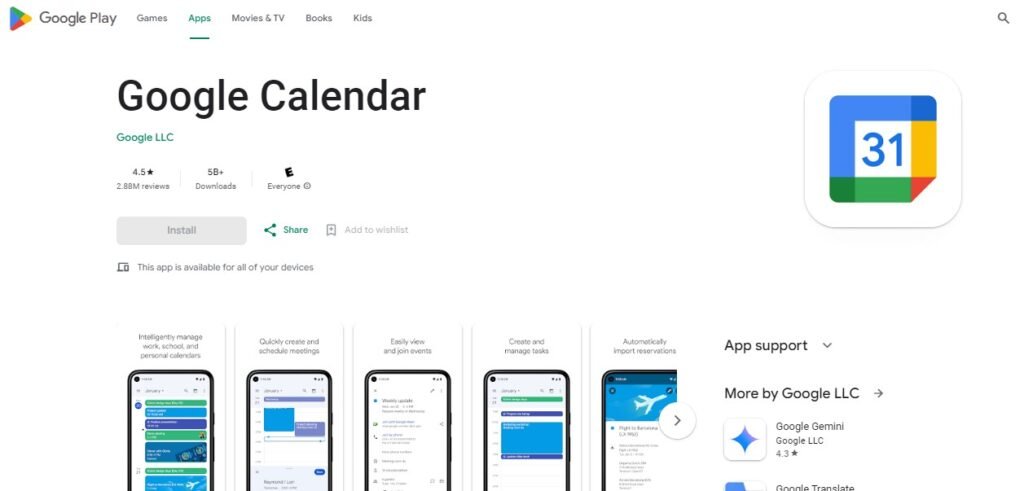
Google Calendar is an excellent tool for organizing your schedule, especially if you are a frequent user of Google Workspace. It offers a user-friendly interface for setting up events, reminders, inviting guests, and even generating Google Meet links for virtual meetings.
While primarily designed for personal use, Google Calendar can also be utilized for managing employee schedules by sharing calendars with other Google users.
Additionally, Gmail integration allows for easy event creation directly from emails, and Google Tasks can be used to create to-do lists that sync with your calendar. Notably, Google Calendar can sync with Apple Health to monitor your exercise routines.
Key Features:
- Access the free version.
- Choose from subscription plans: Google Apps for $5/month/user or Google Apps with unlimited storage and Vault for $10/month/user.
- Get support through Email, Help Center, or Community.
Pros:
- Seamlessly connects with Gmail and Google Meet for enhanced productivity.
- Collaborate and share calendars with fellow users for efficient scheduling.
- Stay organized by creating and managing to-do lists effortlessly.
Cons:
- Not suitable for organizing employee shifts.
- Not recommended for creating employee work schedules.
- Not optimal for managing employee timetables.
4. Appointy.
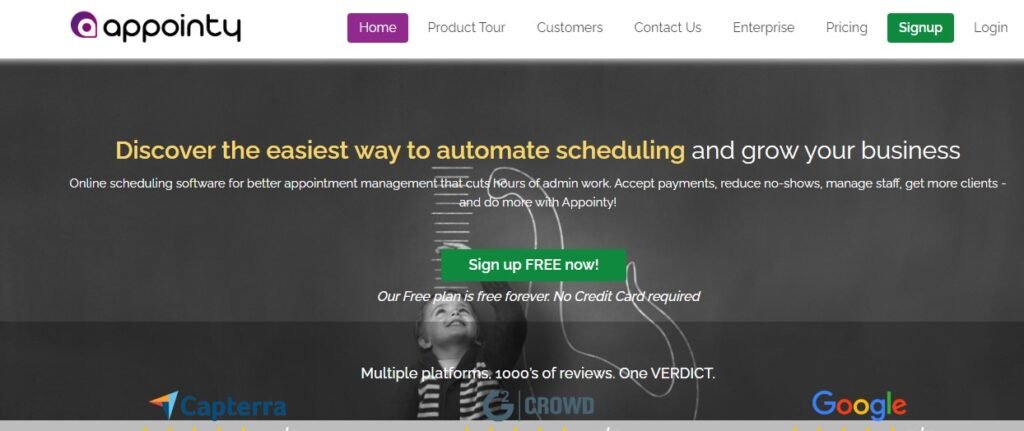
Appointy stands out as the top choice for businesses seeking a customer scheduling solution. This app streamlines the booking process for customers, enabling them to schedule appointments conveniently from any location and at any time.
By integrating with Facebook or your business website, Appointy enhances booking capabilities. You have the flexibility to set available time intervals and permit customers to book recurring appointments. Notably, the app offers exceptional marketing tools, empowering business owners to execute email marketing campaigns, promote special offers, and gather customer feedback.
The free version allows scheduling of up to 100 appointments, accepting Square payments, and incorporating the app’s widget on your website. Upgrading to a paid plan grants access to additional appointments, calendar synchronization, and other premium features.
Key Features:
- Access the complimentary version.
- Choose from various subscription options: Growth for $19.99/month, Professional for $49.99/month, Enterprise for $79.99/month.
- Get assistance through Email, Chat, Phone, Help Center, or Ticket support channels.
Pros:
- Simplify customer appointment booking process.
- Seamlessly integrate Facebook with your business.
- Enhance marketing strategies with powerful tools.
Cons:
- Expensive membership options.
- High-priced subscription packages.
- Costly pricing plans.
5. Opensimsim.
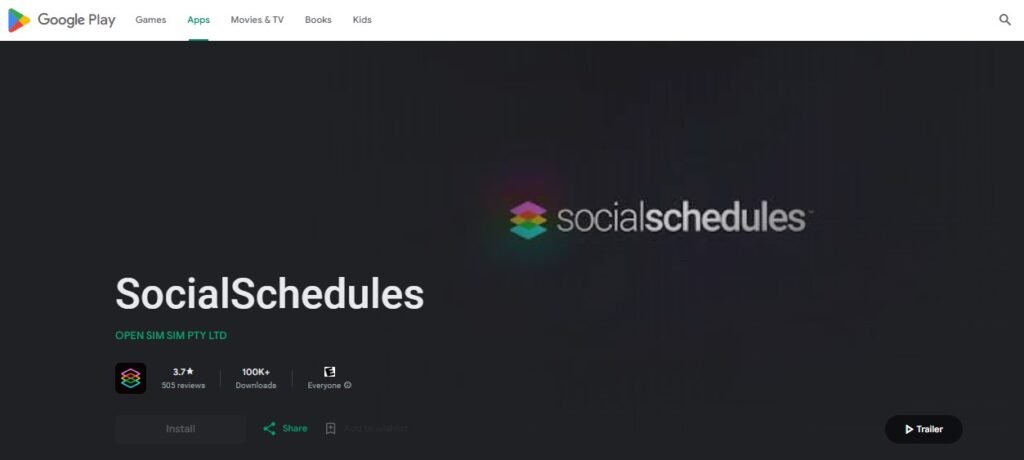
OpenSimSim caters exclusively to businesses in the hospitality and retail sectors, offering a user-friendly schedule maker. With this tool, users can swiftly generate employee schedules, monitor hours, locate replacements, export timesheets, ensure compliance with labor laws, track labor costs, and communicate via private group messaging.
The platform also offers various integrations, such as Square. The free version is ideal for small businesses with one location and up to 10 employees. Upgrading to a paid plan provides access to additional features, including multiple locations, advanced scheduling options, and customized reports.
Key Features:
- Access the free version at no cost.
- Choose from different subscription plans: Basic, Starter, Premium, or Enterprise.
- Get support through Live Chat, Email, or Help Center.
Pros:
- Staff rostering.
- Compliance with labor laws.
- Integration with payroll systems.
Cons:
- Absence of personal scheduling options.
- Lack of individualized scheduling capabilities.
- No provision for personal scheduling needs.
6. Asana.
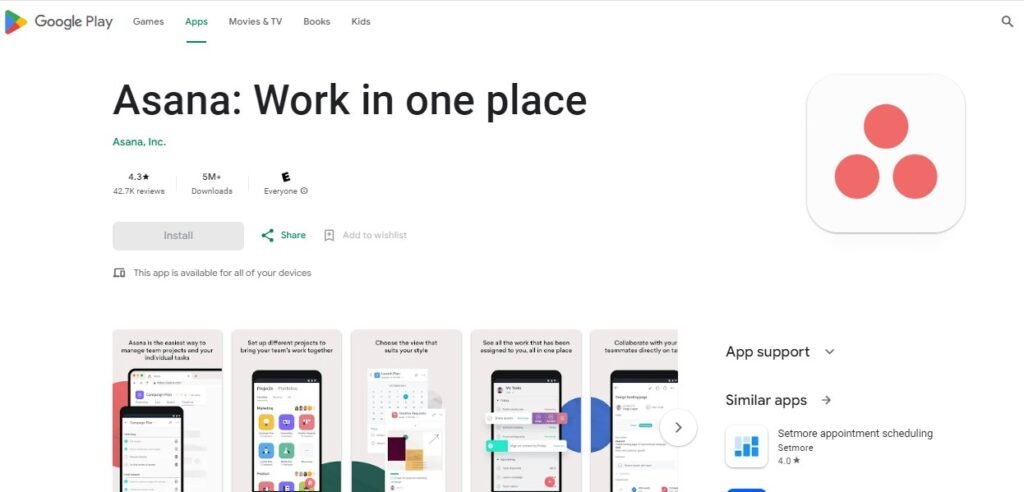
Asana stands out as one of the most extensively used and feature-rich project management tools in the market. It empowers you to efficiently handle almost every aspect of your business. With Asana, you can effortlessly plan, track, and manage team projects, monitor and evaluate marketing campaigns, keep track of time, share attachments, and collaborate seamlessly with your team members.
The calendar view allows you to easily stay on top of assignments and deadlines, and unlike its counterparts, Asana provides real-time updates on the status of individual tasks. Moreover, the app includes chat features that enable you to communicate with team members, vendors, and clients without having to switch platforms.
As for pricing, it is transparent and starts at just $10.99 per user, per month. Additionally, the free version offers an abundance of features, granting you access to unlimited tasks, projects, and messages.
Key Features:
- Access the free version of the product.
- Choose from different subscription plans: Premium for $10.99/month (billed annually), Business for $24.99/month (billed annually), or contact the vendor for Enterprise pricing.
- Get support through the Help Center, Email, Guides, and Forum.
Pros:
- Excellent project management functionalities.
- Free version with abundant features.
- Integrated chat capabilities.
Cons:
- One user cannot be assigned multiple tasks.
- It is not possible to assign multiple tasks to a single user.
- Each user can only be assigned one task at a time.
7. Sling.
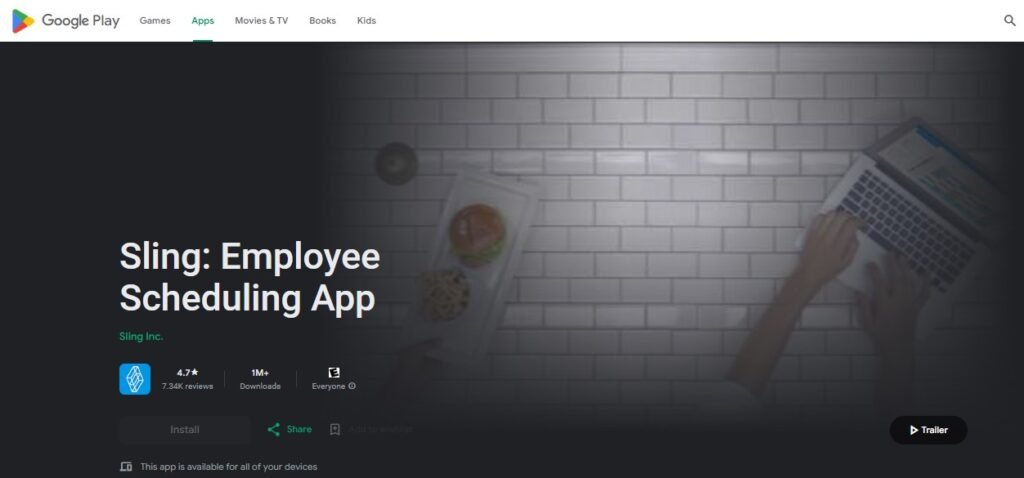
Sling tops our list for employee scheduling with its ability to create schedules for unlimited employees, drag and drop shifts onto a calendar, and set up recurring shifts. What sets Sling apart is its automated scheduling tools that help managers calculate labor costs and prevent double-booking. The app alerts you to any scheduling conflicts or overlapping shifts.
Additionally, Sling offers a time clock for tracking employee hours, task management, and team chat for seamless communication. With Premium starting at just $2 per user per month, Sling is a highly affordable option.
Key Features:
- Access the free version of the product.
- Choose from two subscription plans: Premium at $2/month/user or Business at $4/month/user.
- Get support through email, chat, or the help center.
Pros:
- Competitive rates.
- Wage estimator tool.
- Flexible staff scheduling options.
Cons:
- Absence of personal calendar integration.
- Lack of individualized scheduling options.
- Missing personalized scheduling capabilities.
8. Doodle.
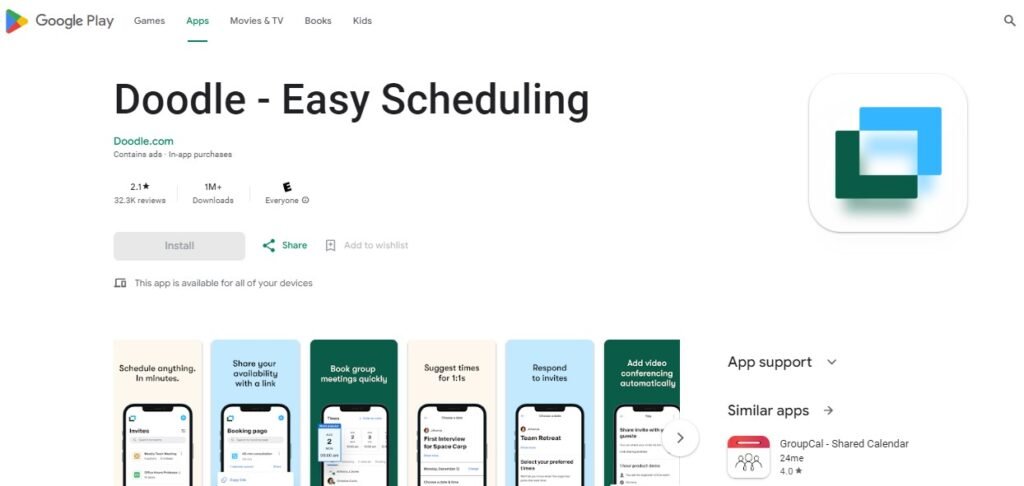
Doodle offers a comprehensive scheduling solution with a free plan that is quite generous. It stands out for its ability to facilitate event scheduling with others by allowing users to propose times for approval. Users can invite participants to indicate their availability without requiring them to have the app.
Additionally, the app can be used for creating personal or employee schedules, communicating with others, and sharing calendars. The free version includes all these essential functions, while premium plans offer ad-free experience, additional integrations, and advanced scheduling capabilities.
Key Features:
- Access the free version today.
- Choose from subscription plans: Pro at $6.95/month (paid annually), Team at $8.95/user/month (paid annually), or Enterprise with custom pricing.
- Get support through Help Center or Email.
Pros:
- Excellent complimentary edition.
- Recommend suitable schedules for confirmation.
- Fantastic no-cost option.
Cons:
- Ads are included in the free version.
- Integrations are restricted in the free version.
- Limited integrations available in the free version.
9. Coursicle.
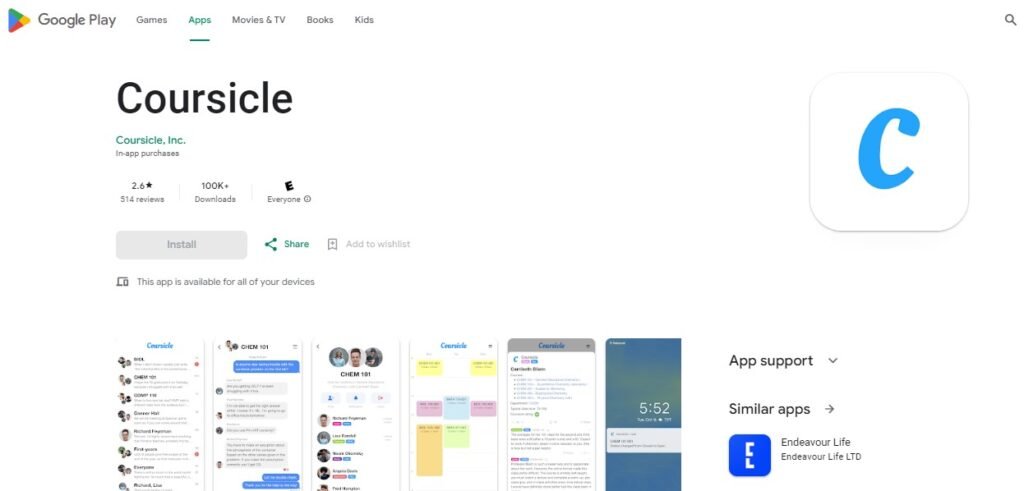
Among the apps on our list, most are tailored for professional and business purposes. However, Coursicle sets itself apart by focusing solely on providing scheduling solutions for students. Developed by a team of recent graduates, Coursicle aims to streamline the process of course registration and scheduling.
With this app, students can effortlessly plan their weekly class schedule by adding classes to their calendars. What makes Coursicle truly exceptional is its ability to connect with various universities across the country, notifying you when a desired class has an available seat.
Upon receiving the notification, you can easily complete the registration process on the school’s website. Additionally, you can explore different classes and access important details such as instructor names, class times, and descriptions.
Key Features:
- Access the free version of the service.
- Choose from subscription plans, including Premium for $4.99 per semester.
- Get support through email.
Pros:
- Class calendars tailored to individual needs.
- Collaborates with universities for class connections.
- Comprehensive course catalog available.
Cons:
- Restricted assistance alternatives.
- Constrained help possibilities.
- Limited aid selections.
10. Homebase.
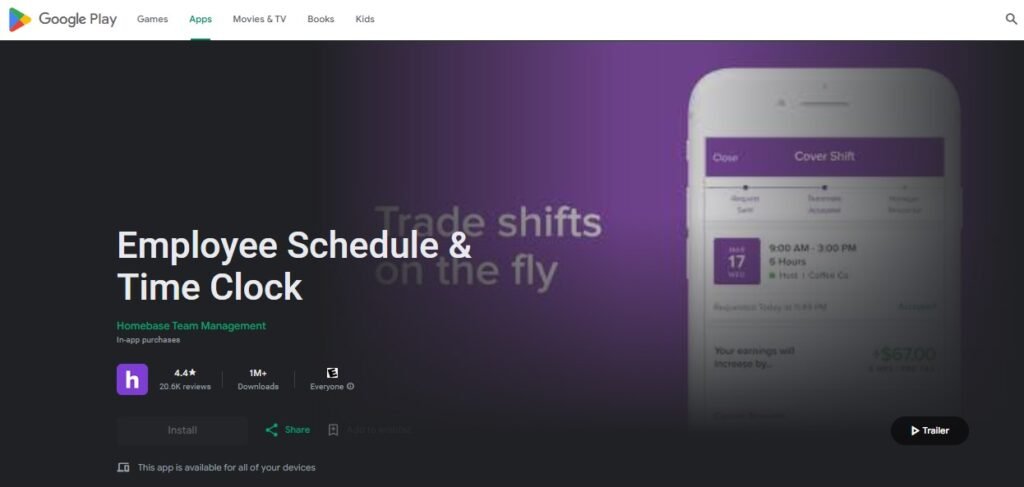
Homebase combines scheduling, payroll, communication, and HR functions all in one convenient service. It stands out for its extensive team communication tools, allowing you to message individuals, groups, or your entire team.
The app also lets you set up automatic reminders for shifts, clock-outs, and schedule changes. With schedule templates and auto-scheduling capabilities, Homebase simplifies the process of creating employee schedules. Its compliance features help ensure that you stay in line with labor laws.
What sets Homebase apart is its comprehensive payroll service, which enables employers to monitor hours, calculate labor expenses, and pay employees directly through the app. Additionally, it handles tax filings, as well as issuing 1099s and W-2s automatically.
Key Features:
- Access the free version at no cost.
- Choose from different subscription plans: Essentials for $14/month/location, Plus for $35/month/location, or All-in-One for $70/month/location.
- Get support through Live Chat, Email, Phone, or Ticket.
Pros:
- Automated scheduling.
- Collaboration tools for team communication.
- Payroll management services.
Cons:
- Does not align with employee schedules.
- Does not match up with employee appointments.
- Does not coordinate with employee agendas.
How to Choose the Best Schedule Maker Apps for Android.
Opting for the finest schedule maker applications on Android can greatly boost your efficiency and assist you in better time management. Take into account these important aspects and explore a selection of top-notch schedule maker apps designed for Android users.
Keys to Consider When Choosing an Schedule Maker App.
A user-friendly interface is essential for any productivity app. The app should be easy to navigate, with clear and intuitive design. Look for apps that offer a pleasant visual layout and make it simple to create, view, and modify your schedules.
1. Features and Customization.
Consider the features the app offers. Essential features might include:
- Calendar integration
- Task and event reminders
- Recurring tasks
- Color coding for different types of tasks
- Widgets for quick access The more customizable the app, the better it can cater to your specific scheduling needs.
2. Syncing and Cross-Platform Support.
If you use multiple devices, it’s crucial that the app supports syncing across all of them. This way, you can access and update your schedule from your smartphone, tablet, or computer. Check if the app is available on other platforms you use.
3. Notifications and Reminders.
Effective schedule maker apps should offer robust notification and reminder systems to ensure you never miss an important task or event. Look for customizable alert options, including the ability to set multiple reminders for a single task.
4. Integration with Other Apps.
Integration with other productivity tools and apps can enhance your scheduling capabilities. Look for apps that integrate with email clients, task management apps, note-taking apps, and other productivity tools you use.
5. Offline Access.
Having access to your schedule even without an internet connection is a significant advantage. Ensure the app allows offline access and will sync any changes once you’re back online.
6. User Reviews and Ratings.
Reading user reviews and checking ratings can provide insight into the app’s reliability and performance. Look for apps with high ratings and positive feedback from users.
7. Price and In-App Purchases.
Consider your budget and whether the app offers a free version or requires a subscription. Some apps provide premium features through in-app purchases, so ensure you understand what you’re getting with each pricing tier.
Schedule Maker App – FAQs.
Are there free schedule maker apps for Android?
Yes, many schedule maker apps offer free versions with basic features. Examples include Google Calendar, Any.do, Trello, and Cozi Family Organizer.
Can I sync my schedule across multiple devices?
Most modern schedule maker apps offer syncing across multiple devices, allowing you to access and update your schedule from your smartphone, tablet, or computer.
Do I need an internet connection to use schedule maker apps?
Many schedule maker apps offer offline access, allowing you to view and update your schedule without an internet connection. Changes will sync once you’re back online.
What are the benefits of using a schedule maker app?
Schedule maker apps help you manage your time, set reminders, organize tasks, and improve productivity. They offer features like calendar integration, task management, and notifications to keep you on track.
How do I choose the right schedule maker app for my needs?
Consider factors like user interface, features, syncing capabilities, notifications, integrations, offline access, user reviews, and pricing. Evaluate these aspects based on your preferences and scheduling needs to find the best app for you.
Conclusion.
Selecting the ideal schedule maker application for Android is contingent upon your individual requirements and inclinations. Take into account the interface, functions, synchronization abilities, alerts, compatibility, offline availability, user feedback, and cost. By assessing these factors, you can discover an application that aids in efficient time management and enhances productivity.
For more insights, head over to IBusinessMotivation.com: Best Finance for Android Apps, Best Job for Android Apps., Best Planner for Android Apps., and Best White Noise for Android Apps.

